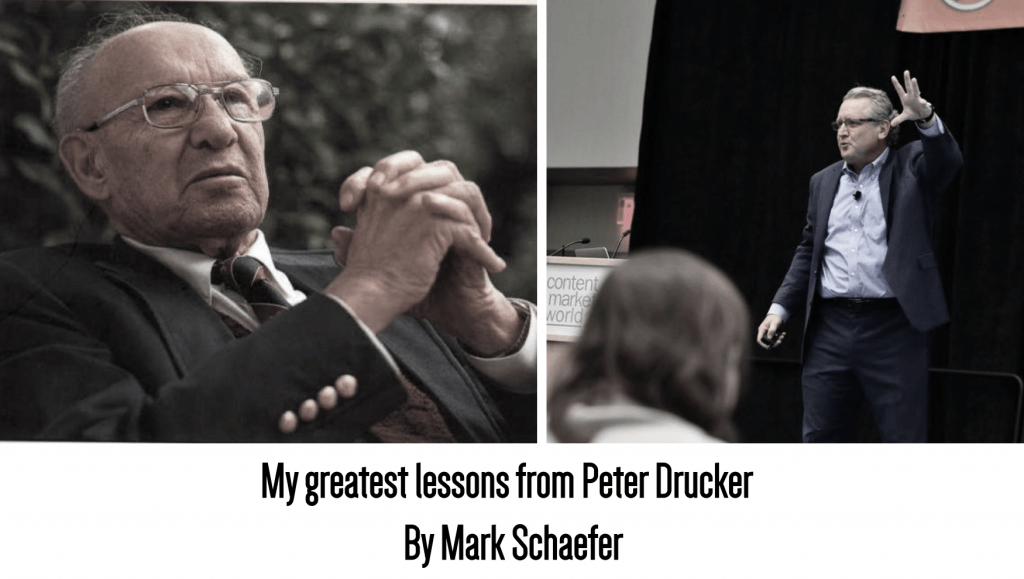
I had the honor of studying under the legendary American management consultant Peter Drucker while I was earning my master’s degree from Claremont Graduate University. To a large extent, this experience helped forge me into a great marketing consultant.
Dr. Drucker was the most brilliant man I’ve known, and this was an extraordinarily impactful period of my professional life. He was one of those few people I’ve met in life who can distill complexity to its essence.
Spending three years under his tutelage literally formed my consulting style and there is not a single week that goes by that I don’t hear his voice in my head. And yet, I realized that I’ve never really talked about those lessons here on my blog.
Today I’ll recount the top five lessons from Dr. Drucker that I think would help anybody become a more effective marketing consultant.
1. The five questions
One of Dr. Drucker’s most famous contributions to management consulting is “the five questions.”
- What is your mission?
- Who is your customer?
- What does your customer value?
- What are your results?
- What is your plan?
You can’t have a business strategy without knowing the answers to these questions in highly accurate detail.
In my practice, I have evolved these questions to a bit of a shortcut. I ask my customers to complete this sentence: “Only we …” To finish that sentence, you need to know how your mission, your customer, etc.
Most companies cannot answer these questions easily, and discerning the answers is job one, no matter how long it takes.
2. The true job of a great marketing consultant
Dr. Drucker taught via the Harvard Case Method. For weeks, our class would dissect lengthy, detailed case studies to try to get to the bottom of the problems. This taught me to remove the emotion from a business situation and observe it as puzzle with many pieces.
My fellow students were all accomplished leaders and eager to “win” the case study by being the first with a correct answer. Dr. Drucker was a pretty mellow guy but boy he would get mad if you tried to “solve” the case study.
“How can you be so arrogant?” he would declare. “The people in this case have worked at their company for 30 years and they can’t figure it out. What makes you think you have the answers?”
The key value of a consultant and a great leader, he said, was not to have the right answers. You needed to have the right questions.
Having this pounded into my head for three years forever changed the way I looked at business and leadership. When I have a consulting engagement, I don’t try to tell people what to do. I’m very humble and ask questions and probe until I have the right questions. If you identify the right questions, the customer is smart enough to know you’re on to something and help figure out a solution.
In a traditional consulting model, the client is a bystander. Dr. Drucker taught me that the client is the true expert and will have the answer, with my guidance.
This also reduces political friction … people like to implement their own solutions!
3. “What everyone knows is usually wrong”
This was one of Dr. Drucker’s mantras, and I have seen this wisdom in action throughout my career.
One value of being an outside consultant is being able to innocently question conventional wisdom. Often, challenging “mass agreement” has provided a spark for breakthrough thinking.
The scenario where I find this most valuable is when it comes to assumptions about customers and what they value. When a discussion begins with “Everybody knows …” about customers and what customers value, I need to question it.
Markets and customers are being profoundly impacted by technology. Marketing plans rarely last more than a year any more. This is why I almost always start a consulting engagement with customer visits, or at least customer discussions, to re-visit client “truths.”
Dr. Drucker taught me the power in ignorance. Once a student asked him how he could know so much about so many industries, and he said “I don’t. That’s my secret! Ignorance is the most powerful element in helping a customer solve problems.”
Luckily, ignorance has always come easy for me.
Here’s an example. One time I was helping a pharma company with a sales problem. They had done a tremendous amount of research to find out what would increase sales with doctors and had created a data-based strategy. But the more money they put into the execution of strategy, the more their sales declined!
“Everybody knows personal selling doesn’t work any more,” I was told … and they had research to prove it. But I needed to question this and noticed in the data that competitors were winning markets by doing the opposite of what our research said to do. They were increasing investment in personal selling efforts. Presumably they had access to the same doctors that we did and had the same research — what was going on here?
This was a clue I could not gloss over.
What I found was that the doctors were not truthful on their survey responses. They hated to admit they liked the personal sales attention but in fact, that is what made them buy! When my client reversed direction and re-invested in personal selling the trend turned around.
4. “The most important part of the communication is what isn’t said.”
Dr. Drucker approached problem-solving like Sherlock Holmes unraveling a mystery.
Once, when we were going through a case, he exclaimed, “The dog isn’t barking! Wouldn’t you expect the dog to be barking? That’s what we’ve been looking for!”
What he meant by this was, often the key to finding an answer is to notice what is NOT there … something that you would expect to be there. When some data point is missing or something just seems to be absent from the puzzle, don’t gloss over it — dive into it. This is almost always an important clue.
I can remember coming home from an engagement and telling my wife “Everyone is so quiet in the meetings. It’s almost like they are afraid to participate. Why aren’t they talking?”
I had been around business long enough to know that this was a clue and what I discovered was that there was a tremendous amount of fear in the organization. The team knew how to solve problems but were afraid to speak up with their opinions. We didn’t have a marketing problem at all. We had a leadership problem.
5. The imperative for change
Peter Drucker is the most-quoted business professional in history and one of his most famous sayings is: “Because the purpose of business is to create a customer, the business enterprise has two–and only two–basic functions: marketing and innovation. Marketing and innovation produce results; all the rest are costs.”
I’m sure this upsets all my accounting friends but I think what Dr. Drucker was saying here is that a company must move forward. If you’re not pushing forward, you’re dying.
This is one of the most challenging issues for a consultant. Many company successes are built on a well-established idea or system. Over time, managers are rewarded for maintaining that idea and system. Even though leaders may talk publicly about the need for change, most are apprehensive about moving into a new future, especially if it means giving up a familiar career.
This is one of Drucker’s strongest messages: Continuing what led to past success will inevitably lead to failure. No matter what. He may have first uttered these words in the 1980s, but the advice is completely relevant today
These are some of the principles that guide me and my consulting practice. This is Dr. Drucker’s voice in my head and I hope in some small way I’ve carried his torch to you today.
 Mark Schaefer is the executive director of Schaefer Marketing Solutions. He is the author of some of the world’s bestselling marketing books and is an acclaimed keynote speaker, college educator, and business consultant. The Marketing Companion podcast is among the top business podcasts in the world. Contact Mark to have him speak at your company event or conference soon.
Mark Schaefer is the executive director of Schaefer Marketing Solutions. He is the author of some of the world’s bestselling marketing books and is an acclaimed keynote speaker, college educator, and business consultant. The Marketing Companion podcast is among the top business podcasts in the world. Contact Mark to have him speak at your company event or conference soon.


